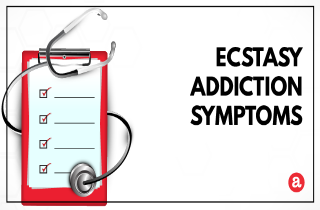Has ecstasy use become compulsive?
Do you think you know someone who may be addicted to ecstasy?
Ecstasy, the street name for MDMA (3,4-methylenedioxy-N-methylamphetamine) is thought NOT to be habit forming. But this is not true. And ecstasy addiction is not a joking matter. In fact, when someone takes ecstasy on a regular basis their body and mind start to become accustomed to it. They will feel that they cannot function properly without ecstasy and if they stop taking it, they will go through withdrawal. Ecstasy withdrawal syndrome can induce serious cases of depression, and anxiety, or extreme fatigue.
If you know someone who may be addicted to ecstasy, please get them to seek help to treat ecstasy addiction immediately. Below, we review the signs and symptoms to look out for. And we invite your questions about helping ecstasy addiction, use, or associated problems at the end.
Symptoms of ecstasy addiction
The short term effects that users of ecstasy feel is emotional warmth, mental stimulation, increased energy, and enhanced sensory perception. So a person under the influence of ecstasy will feel happy, loose, full of energy, and experience enhanced senses. However, the withdrawal period of ecstasy addiction is not so bright. As MDMA leaves your body, you “crash” from depleted levels of dopamine in your brain. But what are long term signs that you have a problem with ecstasy?
The Diagnostic and Statistical Manual of Mental Disorders (DSM) clinical criteria for ecstasy addiction includes a few main characteristics. If you have ever experienced any of the following, see a doctor, psychiatrist, or psychologist for a medical assessment of your ecstasy use.
1. Using more ecstasy than intended
2. Persistent desire to cut down or control ecstasy use
3. Spending too much time getting or using ecstasy
4. Giving up important activities to do ecstasy
5. Continued use of ecstasy despite knowledge of physical or psychological problems caused by it
Ecstasy addiction symptoms: Can they be treated?
Treating ecstasy addiction should be of the upmost importance to abusers of the drug who are experiencing significant negative impacts on their lives or the lives around them. Here, we will review some of the addiction treatment programs that can be used to help an addict recover or stop abuse of ecstasy.
1. Cognitive Behavioral Interventions
Cognitive Behavioral Therapy (CBT) is a psychotherapeutic approach that helps address abnormal emotions, dysfunctional behaviors, and cognitive processes through a goal-oriented systematic procedure. The therapy is effective for regulating withdrawal symptoms that can come as a result of stopping ecstasy use such as anxiety, personality, mood, or psychotic disorders. CBT is offered in both individual and group settings, and is often a manual process with direct, brief, time-constricted treatment for individual psychological disorders.
2. Support groups for ecstasy addiction
If you are attempting to give up ecstasy, peer support groups can be a very helpful source of encouragement, guidance, and assistance. Support groups are helpful in both having a safe place to discuss challenges and get support, and also helping you maintain sobriety. When you connect with peers who have experienced what you have and know what you are going through first hand, it can help to reduce feelings of being lost or hopeless. When you are backed by the encouragement of a support group staying motivated is a lot easier, especially when you can turn to lean on them when getting through rough time periods. Narcotics Anonymous (NA) is one of the most popular self-help groups for drug addicts looking for treatment and recovery. NA supports recovery of all types of substance abuse, not just alcohol, and provides a 12 step program to help members achieve and maintain their sobriety.
3. Detoxification clinic
Detoxification is a great way to start the process of recovering from ecstasy addiction. Detox clinics help patients reduce the psychological and physical effects of withdrawal from ecstasy use. Medical professionals in detox treatment centers can carefully monitor a patient’s progress, and assist them in overcoming rough times during the initial process of withdrawal. If you consistently abuse ecstasy for a long period of time, the chemicals in ecstasy can have a severe negative effect on how your body and brain functions. Combined with support groups, a detox clinic can greatly help prevent the possibility of relapse or severe mental or physical suffering.
Signs and symptoms of ecstasy addiction questions
Still need clarity about the signs and symptoms of ecstasy addiction? We welcome you to ask questions below about ecstasy and possilbe addiction. We will try to answer any questions related to the topic as soon as possible.









Related Posts